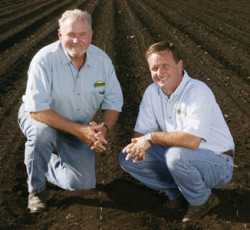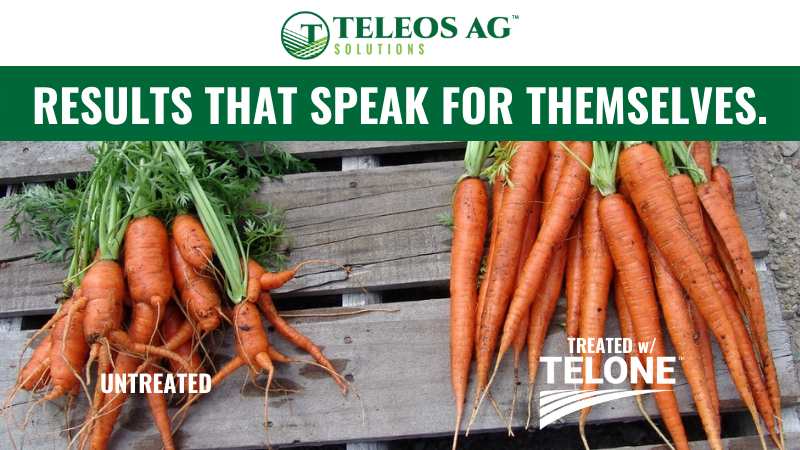R.C. Hatton Stays Ahead Of The Curve

In the 1960s, R.C. Hatton Farms was one of the first vegetable growers to use aerial pest control applications. In 1978, the farm was one of the initial operations to plant Sh2 (super sweet gene type) corn, and then was one of the earliest growers to use Monosem planters. Later, R.C. Hatton became one of the first vegetable growers in Florida to use returnable plastic containers (RPCs) in the packinghouse. These are just a few examples of how being at the forefront of embracing new technologies has helped the Pahokee operation survive and thrive for more than 75 years.
Ongoing Operation Expansion
Founded on approximately 200 acres in 1932 by Robert C. Hatton, R.C. Hatton Farms has steadily expanded over the years to its current size of 12,000 acres. Today, Roger Hatton (son of Robert) and Paul Allen own the bustling business.
“In the 1960s, the advent of aerial applications allowed the farm to quadruple in size within five years,” says Hatton. “It allowed us to grow pest-free products at affordable costs.”
Later acreage increases were due in large part to customers wanting an annual supply.
“A dozen customers buy 80% to 90% of our product,” says Allen. “They want to deal year-round with the same farmer/shipper/marketing agency.”
Although the farm does not yet produce 12 months of the year, it purchases product from other farms for their customers during the period of July 15-Sept. 15.
Computer technology also has contributed to the farm’s expansion. With laptop computers and satellites, managers in the field can track and transmit information on pesticide applications, best management practices, as well as planting and harvesting records.
“Computers can track the sowing distance of seed, the population of seed, fertilizer output, etc., which makes for more precise planning,” says Allen. “Computerized record-keeping is how we achieve such high food safety standards.”
The farm earned a gold rating two years in a row from Tescoe Nature’s Choice and is EUREPGAP certified.
Greater Returns With RPCs
R.C. Hatton uses a special system to pack sweet corn into returnable plastic containers (RPCs) that are display-ready for retailers. Instead of packing corn in the field, like most growers do, R.C. Hatton transports it in reinforced bins to the packinghouse, where it is packed in RPCs under indoor conditions.
“Packing indoors is less labor intensive, more efficient, and increases productivity by 50%,” says Allen.
“Laborers are working in a more friendly environment (not out in the sun, wind, or rain), so we are able to get better employees who become more productive and make more money,” adds Hatton.
Team Effort
Providing employees with the most comfortable working conditions possible is a top concern for R.C. Hatton.
“Workers begin picking between 4:00 a.m. and 6:00 a.m. and are done by noon, before it is too terribly hot,” says Hatton. “Packing operations begin at 8:00 a.m. so parents can drop their kids off at school before coming to work. There’s more to it than just making a buck. If you provide a good lifestyle, it’s good for business.”
Allen attributes the success of the farm to its employees. “We have the greatest employees that work along side of us. They know our goals, and what drives us as owners is our mission statement (see sidebar below).”
Allen also thinks the age difference between himself and Hatton keeps the company healthy. While Hatton, 63, brings many years of experience and historical knowledge to the table, Allen, 42, is focused on looking ahead and bringing the next generation (his son Jonathan) on board in the business.
Meeting Marketing Demands
Another area Allen is directing his attention to is marketing.
“The sweet corn industry is more mature now,” says Hatton. “A nearly perfect crop is assumed, and the challenge is marketing it. What’s changed is the way in which customers consume the product. Working housewives want it ready to go.”
With that in mind, Allen was responsible for research and development of value-added tray packs for the farm’s sweet corn. Cut and washed ears of corn are sold in two-packs or four-packs that are microwavable. Hugh Branch Inc., the country’s largest distributor of sweet corn, markets all of R.C. Hatton’s produce, including 2-inch ears of corn for children called Mini-Sweets.
Allen’s industry involvement keeps him in tune with market trends and demands. He serves as the Florida Sweet Corn Exchange president as well as a board member for Farm Bureau and the Florida Fruit and Vegetable Association.
Confronting Challenges
While the commercial food-service side of the business is blessed with strong sales, the farm is not without challenges. Allen ranks long-term land availability, food safety, and labor at the top of the list.
“We always try to have our risk spread on land availability, owning land but also leasing from several different land owners,” says Allen. “We have recently hired (along with other growers in the Hugh Branch marketing group) a full-time food safety director, Kiley Harper-Larsen. We continue to look to more mechanization along with petitioning government for a sustainable work force.”
R.C. Hatton is addressing another challenge, too — the escalating cost of inputs. The farm is looking at alternatives to standard fertilizers and is using more fuel-efficient tractors. Leasing (not owning) tractors has proven to be a money saver, too.
Challenges aside, Allen and Hatton love what they do and say the future looks bright for the farm.
Grower Steve Williams of Knight Management, a friendly competitor of R.C. Hatton, concludes, “Allen and Hatton are stand-up individuals and good business people. Their resources combined with their management skills make them a formidable player in the Glades.”









